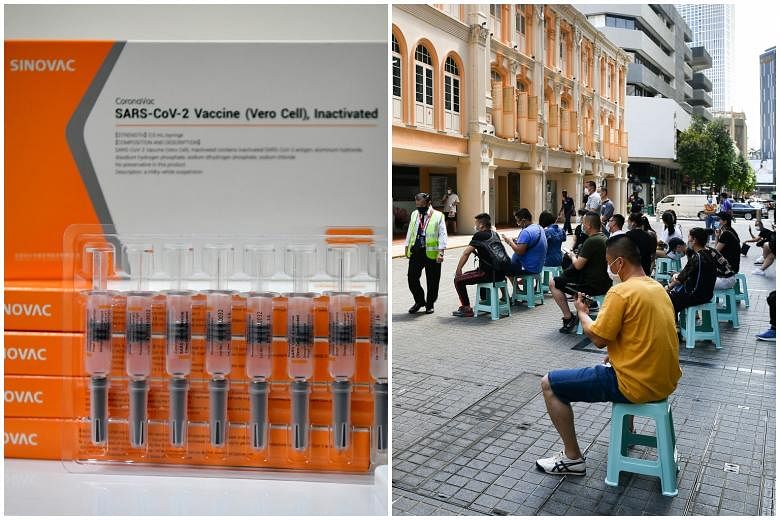SINGAPORE - People who have received the Sinovac Covid-19 vaccine will not be exempted from pre-event testing, said the Ministry of Health (MOH) on Wednesday (June 30).
Vaccines not included in Singapore's national vaccination programme - Sinovac is among them - may lack sufficient documentation of how effective they are at protecting people against Covid-19 infection and, in particular, against the Delta variant of the virus currently circulating, said MOH.
The Delta strain is a new mutation of the coronavirus that is more infectious.
"Hence, from the public health point of view, individuals vaccinated with vaccines other than those in our Covid-19 national vaccination programme will still have to undergo pre-event testing," said MOH.
The Government previously said that those who are fully vaccinated are exempted from pre-event testing before attending events such as live performances, Mice (meetings, incentives, conventions and exhibitions) events, and wedding solemnisations.
The authorities gave approval last month to 24 private healthcare clinics to draw on the Government's existing stock of Sinovac vaccine.
Dr Leong Hoe Nam of Rophi Clinic told The Straits Times (ST) on Wednesday that his clinic has administered more than 400 doses of the Sinovac vaccine, with many recipients of the jab being Chinese nationals and elderly people who choose Sinovac out of fear of not being able to tolerate mRNA vaccines.
"Fear of the unknown, allergies, concomitant medical conditions, or stories of friends and relatives who suffered a bad outcome after taking the mRNA vaccines are some of the reasons why people turn to Sinovac. Stories of people suffering from stroke and heart attacks from mRNA vaccines are still circulating," Dr Leong said.
The Sinovac vaccine is not part of Singapore's national vaccination regime, which currently uses the Pfizer-BioNTech/Comirnaty and Moderna vaccines, both of which use mRNA technology.
Chief executive of Icon Cancer Centre Serena Wee told ST that it administers 25 to 30 Sinovac vaccines a day and started vaccinations on June 21.
Ms Wee said: "Some patients have shared concerns over the mRNA vaccines that use the relatively new messenger RNA technology, which teaches our cells how to make a protein to trigger an immune response. Sinovac, however, utilises the same technology which has been used in traditional vaccines for flu shots, polio and so on, and hence is deemed by many to be less of an unknown and tested over time."
Others think that the Chinese government will ease entry restrictions for people who have had the Sinovac vaccine and that visa applications for foreigners will be more convenient if they have taken the Sinovac jab, Ms Wee added.
Over the past two weeks, many of these clinics have been inundated with calls and requests from residents wanting the Sinovac jab, as many rushed to register their interest and get on the waitlist for the China-made vaccine.
This is despite the authorities saying that the Sinovac vaccine is not entirely effective at preventing infection, based on evidence from other countries.
On June 22, the Roman Catholic Archdiocese of Singapore posted on its website that only the Pfizer and Moderna jabs will be accepted for pre-event exemptions for certain masses here and congregants will be required to show proof of this.
It issued a clarification three days later that the Sinovac vaccine is not under the MOH's list of recognised vaccines that allow exemption from pre-event testing.
"We would also like to encourage members of the faithful who have yet to be vaccinated, or who have received the Sinovac vaccines, to continue to attend masses that are meant for 50 or fewer persons. For these masses, no pre-event testing is required and all the faithful, including non-vaccinated individuals, are able to attend them," it said.
The Sinovac vaccine remains unregistered and is not authorised by the Health Sciences Authority (HSA) for use under the Pandemic Special Access Route. It is to be provided here only under the Special Access Route (SAR) framework.
Vaccines under this framework are not covered under the Vaccine Injury Financial Assistance Programme, the scheme that supports people who suffer adverse effects from their Covid-19 jabs, meant for the national vaccination programme.
The ministry added on Wednesday that doctors are required to inform their patients receiving vaccines under the SAR framework that they may not be regarded in the same manner as those vaccinated under the national programme.
This allows their patients to weigh risks versus benefits when proceeding with vaccination using SAR vaccines, said MOH.











